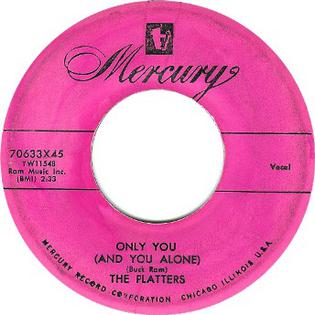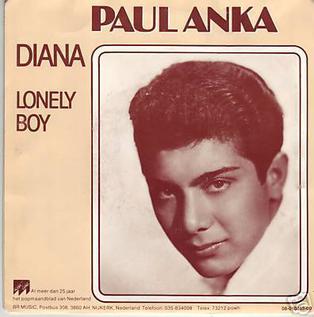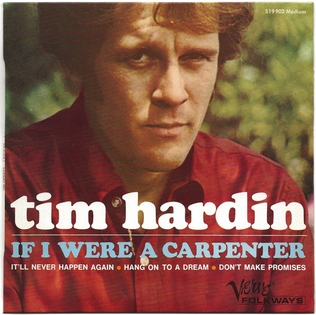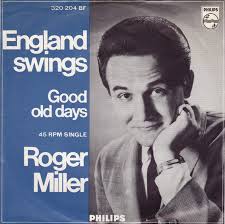Related Research Articles

Franklin Joseph Lymon was an American rock and roll/rhythm and blues singer and songwriter, best known as the boy soprano lead singer of the New York City-based early rock and roll doo-wop group The Teenagers. The group was composed of five boys, all in their early to mid-teens. The original lineup of the Teenagers, an integrated group, included three African-American members, Lymon, Jimmy Merchant, and Sherman Garnes; and two Puerto Rican members, Joe Negroni and Herman Santiago. The Teenagers' first single, 1956's "Why Do Fools Fall in Love", was also their biggest hit. After Lymon went solo in mid-1957, both his career and that of the Teenagers fell into decline. In 1968, Lymon was found dead at the age of 25 on the floor of his grandmother's bathroom from a heroin overdose. Lymon was posthumously inducted into the Rock and Roll Hall of Fame in 1993 as a member of the Teenagers. His life was dramatized in the 1998 film Why Do Fools Fall in Love.

"Only You (And You Alone)" (often shortened to "Only You") is a pop song composed by Buck Ram. It was originally recorded by The Platters with lead vocals by Tony Williams in 1955.

"Chantilly Lace" is a 1958 rock and roll song by The Big Bopper. It was produced by Jerry Kennedy, and reached No. 6 on the US Billboard Hot 100. Bruce Channel covered the song on his 1962 album, Hey! Baby. The song was also covered by Jerry Lee Lewis in 1972.

"Why Do Fools Fall in Love" is a song by American rock and roll band Frankie Lymon & the Teenagers that was released on January 10, 1956. It reached No. 1 on the R&B chart, No. 6 on Billboard's Pop Singles chart, and No. 1 on the UK Singles Chart in July. Many renditions of the song by other artists have also been hit records in the U.S., including versions by the Diamonds, the Beach Boys, and Diana Ross.
"Dedicated To The One I Love" is a song written by Lowman Pauling and Ralph Bass that was a hit for the "5" Royales, the Shirelles, the Mamas & the Papas and Bitty McLean. Pauling was the guitarist of the "5" Royales, the group that recorded the original version of the song, produced by Bass, in 1957. Their version was re-released in 1961 and charted at number 81 on the Billboard Hot 100.

"Diana" is a song written and first performed by Paul Anka, who recorded it in May 1957 at Don Costa’s studio in New York City. Anka stated in his autobiography that the song was inspired by a girl named Diana Ayoub, whom he had met at his church and community events, and had developed a crush on. Session musicians on the record included George Barnes playing lead guitar, Bucky Pizzarelli playing the "Calypso" riff on guitar, Irving Wexler on piano, Jerry Bruno on bass, and Panama Francis on drums. The song was recorded in May 1957 at RCA Victor Studios in New York. Backup singers included Artie Ripp.

"If I Were a Carpenter" is a folk song written by Tim Hardin in the 1960s, and re-recorded with commercial success by various artists including Bobby Darin, The Four Tops and Johnny Cash. Hardin's own recording of the piece appeared on his 1967 album Tim Hardin 2. It was one of two songs from that release performed by Hardin at Woodstock in 1969. The song, believed by some to be about male romantic insecurity, is rumored to have been inspired by his love for actress Susan Morss, as well as the construction of Hardin's recording studio.

"Sherry" is a song written by Bob Gaudio and recorded by The Four Seasons.

"Rockin' Robin" is a song written by Leon René under the pseudonym Jimmie Thomas, and recorded by American singer Bobby Day in 1958. It was Day's biggest hit single, becoming a number two hit on the Billboard Hot 100, and spent one week at the top of the R&B sales chart. Michael Jackson recorded his own version of the song in 1972, which also achieved success.
"You're Nobody till Somebody Loves You" is a popular song written by Russ Morgan, Larry Stock, and James Cavanaugh and published in 1944. The song was first recorded by Morgan and was a hit for him in 1946, reaching the No. 14 spot in the charts. The best known version was Dean Martin's, which was released in 1960 and reissued in 1964.

"Go Away Little Girl" is a popular song written by Gerry Goffin and Carole King. It was first recorded by Bobby Vee for Liberty Records on March 28, 1962. The lyrics consist of a young man asking a young attractive woman to stay away from him, so that he will not be tempted to betray his steady girlfriend by kissing her. The song is notable for making the American Top 20 three times: for Steve Lawrence in 1963, for The Happenings in 1966, and for Donny Osmond in 1971. It is also the first song, and one of only nine, to reach US number 1 by two different artists. Also notable in each of the solo versions is the similar double-tracked treatment of the singer's voice.
"A Little Bitty Tear" is a song written by the American country songwriter Hank Cochran. It has been recorded by many musical acts, the first being American recording artist Burl Ives. It has since been recorded by others, including Wanda Jackson, Bing Crosby, Chet Atkins, The Shadows and Cochran himself.
"Wild One" is a song written by Dave Appell, Kal Mann and Bernie Lowe, and performed by Bobby Rydell. Session drummer Gary Chester played on the recording, which was released as a single in 1960.
Thurston Harris was an American singer and songwriter, best known for his 1957 hit "Little Bitty Pretty One".
The Hollywood Flames were an American R&B vocal group in the 1950s, best known for their No. 11 hit "Buzz-Buzz-Buzz" in 1957.
"There! I've Said It Again" is a popular song written and published by Redd Evans and David Mann in 1941. In early 1945, Vaughn Monroe and his Orchestra released Victor 20-1637, which reached the number one position on the Billboard's National Radio Airplay chart for five straight weeks, then no.2 for six more weeks, and a total run of 29 weeks. It finished 1945 as the no. 4 record of the year.

"Only Love Can Break a Heart" is a popular song from 1962, performed by the American singer-songwriter Gene Pitney. The song was written by Hal David (words) and Burt Bacharach (music) and appears on Pitney's second album Only Love Can Break a Heart.

"She's All I Got" is a song written by Gary U.S. Bonds and Jerry Williams Jr. It has been recorded by several artists. The first version, released in 1971 by Freddie North, was a Top 40 U.S. pop hit, and a version by Johnny Paycheck was a number 2 U.S. country hit that same year. A second country music version was released on Conway Twitty's 1972 Decca LP I Can't See Me Without You. There was also a version titled "He's All I Got" that was on Tanya Tucker's 1972 album Delta Dawn. Yet another cover titled "Don't Take Her She's All I've Got" was released by Tracy Byrd, whose version reached number 4 on the U.S. and Canadian country singles charts. Co-author Jerry Williams Jr., aka Swamp Dogg, released his own version on his 2020 album Sorry You Couldn’t Make It.

"England Swings" is a 1965 country music song written and performed by American singer-songwriter Roger Miller. The single was Miller's eleventh hit on the US country chart where it peaked at number three. On the Billboard Hot 100, it peaked at number eight and was Miller's second number one on the Easy Listening chart. Petula Clark and Pat Boone both released cover versions in 1967.
"Once You Get Started" is a horn-driven funk number written by musician Gavin Christopher, and recorded and released by the band Rufus featuring Chaka Khan in late 1974. The song is led mostly by Khan, though fellow group member Tony Maiden contributed lead vocals for the song's second verse. It helped to make their third album Rufusized go platinum. "Once You Get Started", peaked at number ten on the Billboard Hot 100 in 1975, giving the group their second top ten single and third top forty single overall. The song also hit number-four on the Hot Soul Singles chart as well as number six on the Record World, Disco File Top 20 chart.
References
- ↑ Dave Marsh, The Heart of Rock & Soul: The 1001 Greatest Singles Ever Made (Da Capo Press, 1999), 429.
- ↑ The Lamplighters at Allmusic
- ↑ Whitburn, Joel (2004). Top R&B/Hip-Hop Singles: 1942-2004. Record Research. p. 246.
- ↑ "CHUM Hit Parade - November 18, 1957".
- ↑ "Bush Likely to OK Bill That Would Renew All Pre-1978 Copyrights." Billboard 20 June 1992.
- ↑ Vladimir Bogdanov, Chris Woodstra, John Bush, and Stephen Thomas Erlewine, All Music Guide to Soul: The Definitive Guide to R&B and Soul (Backbeat Books, 2003), p. 297.
- ↑ Otfinoski, Steven (December 30, 1997). The Golden Age of Rock Instrumentals. Billboard Books. ISBN 9780823076390 – via Google Books.
- ↑ Gillett, Charlie (May 1, 2011). The Sound of the City: The Rise of Rock and Roll. Souvenir Press. ISBN 9780285640245 – via Google Books.
- ↑ "Frankie Lymon - Chart history". Billboard. 1960-08-20. Retrieved 2016-08-29.
- ↑ Whitburn, Joel (2009). Top Pop Singles (12th ed.). p. 645.
- ↑ Soulsation! (1995), liner notes
- ↑ Whitburn, Joel (2009). Top Pop Singles (12th ed.). p. 482.
- ↑ "Hits of the Week" (PDF). Record World. April 15, 1972. p. 1. Retrieved 2023-04-01.